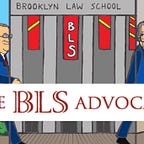The Introverted Law Student: A Gift to the Classroom, Not A Curse
Society paints a picture of the typical lawyer as a bold and confident individual. Society’s attorney is ready to take on courtroom at any time with ease. The quiet law student, typically found in the way back of the room hiding from their professor, asks: “How the hell am I going to do that if I am terrified of being cold-called in class?” Now, this student knows the case front and back with the ability to answer any question the professor would potentially throw their way. So what is their “problem?”
Usually, the “quiet law student” is one that is either shy, an introvert, or could possibly be facing social anxiety disorder or social phobia. Classroom management techniques frequently used in law schools, such as the Socratic Method and cold-calling, usually will cause discomfort in this type of student. Although the quiet law student becomes uncomfortable when cold-called, this response should not be confused with their preparation or capability to answer their instructors’ questions. Usually, they are the most prepared person in the classroom as a result of their fears and could easily answer questions. However, no amount of preparation can put this student’s mind at ease. This can break an otherwise academically strong student’s confidence which may cause them to hide in the back of the room or skip class all together. In addition, a student’s public speaking anxiety can impair their processing of new information and comprehension of legal concepts. This impediment on the learning process could cause a detrimental effect on their overall academic performance. The introverted law student experiences social anxiety in and outside of the classroom. Their overall well-being on campus is at risk, as they may find it difficult to engage with professors and peers.
Finding solutions for anxious law school students is not an easy feat. As noted in a Duquesne Law Review Article written by Brooklyn Law School’s own Heidi K. Brown, “[e]ven those who admit this anxiety and boldly seek help from professors, mentors, or academic support professionals often are left to fend for themselves if the particular advisor (who may have never experienced this affliction personally) does not fully understand the psychological depth of this issue.” Extraverted students suggest the problem should be tackled head-on by “just doing it,” as if it were an easy task. According to Brown, many law professors assume that “students automatically should be able to deal with the rigors of the Socratic Method or other ‘command’ speaking performances…”. The law professors making these assumptions believe if students are unable to “deal,” they should choose a new career path all together.
Rather than viewing introversion as a plague, psychological research shows it is in fact a gift. According to a study from “Quiet: The Power of the Introverts in a World That Can’t Stop Talking”, Dr. Laurie Helgoe suggests, “[a]n introvert who sits back in a meeting, taking in the arguments, dreamily reflecting on the big picture, may be seen as not contributing — that is, until he works out the solution that all the contributors missed.” There are a number of professors that are compassionate towards this issue, including Professor Joe Bankman of Stanford Law School. Through the pursuit of his PsyD (Doctor of Psychology) Professor Bankman came to understand that the ultimate failure of brilliant and capable students is not due to a lack of necessary skills, but rather a “lack emotional resilience to cope with the stresses and challenges of a demanding professional career.” Professor Bankman designed a two-hour course for first-year law students to explain anxiety and tackle the issue using cognitive behavioral therapy.
Unfortunately, BLS does not offer a similar course geared toward helping students cope with anxiety and stress. However, this does not mean BLS students experiencing some form of social anxiety or phobia should ignore it. Some helpful tips to manage anxiety include: yoga and meditation, trying to avoid negative thoughts by thinking realistically and focusing on the facts, setting small goals for yourself in and out of the classroom, and talking to other students (many of which are experiencing the same thoughts and feelings). Of course, if you believe your fears or anxiety is causing an extreme detriment to your overall health and well-being, it is advisable to seek the help of a professional such as a social worker, psychiatrist or psychologist (refer to ZocDoc.com or PsychologyToday.com to find local professionals).
To all of you quiet law students and introverts: when you are feeling down, you are intelligent, you are capable and you are on the right career path, so do not let anyone tell you otherwise. The legal profession needs your observations and insight. Keep on keepin’ on, you got this.
Sources:
http://www.duqlawblogs.org/lawreview/wp-content/uploads/2014/01/53.1_Brown_Article.pdf
